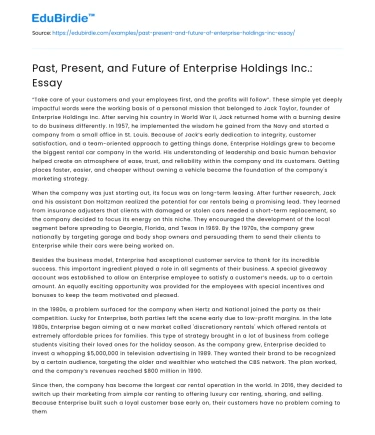“Take care of your customers and your employees first, and the profits will follow”. These simple yet deeply impactful words were the working basis of a personal mission that belonged to Jack Taylor, founder of Enterprise Holdings Inc. After serving his country in World War II, Jack returned home with a burning desire to do business differently. In 1957, he implemented the wisdom he gained from the Navy and started a company from a small office in St. Louis. Because of Jack’s early dedication to integrity, customer satisfaction, and a team-oriented approach to getting things done, Enterprise Holdings grew to become the biggest rental car company in the world. His understanding of leadership and basic human behavior helped create an atmosphere of ease, trust, and reliability within the company and its customers. Getting places faster, easier, and cheaper without owning a vehicle became the foundation of the company's marketing strategy.
When the company was just starting out, its focus was on long-term leasing. After further research, Jack and his assistant Don Holtzman realized the potential for car rentals being a promising lead. They learned from insurance adjusters that clients with damaged or stolen cars needed a short-term replacement, so the company decided to focus its energy on this niche. They encouraged the development of the local segment before spreading to Georgia, Florida, and Texas in 1969. By the 1970s, the company grew nationally by targeting garage and body shop owners and persuading them to send their clients to Enterprise while their cars were being worked on.
Save your time!
We can take care of your essay
- Proper editing and formatting
- Free revision, title page, and bibliography
- Flexible prices and money-back guarantee
Besides the business model, Enterprise had exceptional customer service to thank for its incredible success. This important ingredient played a role in all segments of their business. A special giveaway account was established to allow an Enterprise employee to satisfy a customer’s needs, up to a certain amount. An equally exciting opportunity was provided for the employees with special incentives and bonuses to keep the team motivated and pleased.
In the 1980s, a problem surfaced for the company when Hertz and National joined the party as their competition. Lucky for Enterprise, both parties left the scene early due to low-profit margins. In the late 1980s, Enterprise began aiming at a new market called 'discretionary rentals' which offered rentals at extremely affordable prices for families. This type of strategy brought in a lot of business from college students visiting their loved ones for the holiday season. As the company grew, Enterprise decided to invest a whopping $5,000,000 in television advertising in 1989. They wanted their brand to be recognized by a certain audience, targeting the older and wealthier who watched the CBS network. The plan worked, and the company’s revenues reached $800 million in 1990.
Since then, the company has become the largest car rental operation in the world. In 2016, they decided to switch up their marketing from simple car renting to offering luxury car renting, sharing, and selling. Because Enterprise built such a loyal customer base early on, their customers have no problem coming to them for all their transportation needs. They were also working on branching out to the online world, using strategies that allowed them to connect to their audience emotionally by incorporating their target audience’s passions in their marketing campaigns.
Currently, Enterprise segmentation can be broken down into these categories: demographic, psychographic, geographic, and behavioral segmentation. On the demographic side, individuals between the ages of 18-65 are their main target audience. If you are a person in this age group, chances are you’ve seen their advertisements or physical location at least once. Geographically, you can find an Enterprise building in your home city, given it’s in the United States. Almost every person in the age group mentioned has a driver’s license, therefore a car rental company like Enterprise can exist almost anywhere. From a behavioral point of view, people rent cars only when necessary, therefore reliability, comfort, and safety are a must. Lastly, psychologically, this market appeals to the middle and upper class. These are working businessmen and women who recognize the importance of commuting, working, and achieving their goals.
In the future, many routes can be taken to expand even further. For example, Enterprise could establish more locations near places like airports, bus stops, and train stations. This would give travelers more options when going long distances. Not much advertising would need to be done since their customers would be on the go already.
In conclusion, Enterprise Holdings has come a long way from its humble beginnings in 1957. Not only were they able to grow rapidly, but they did so by staying true to the values that were instilled within them by their founder, Jack Taylor. Their marketing strategies have worked wonders so far, and if they continue to put their customers first, there is no way they can fail.






 Stuck on your essay?
Stuck on your essay?

